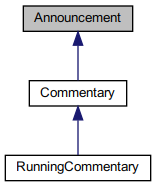Base/abstract announcer class. More...

Public Member Functions | |
| def | __init__ (self, theConfig) |
| Constructor for announcer class. More... | |
| def | ack (self) |
| Send along to Announcement that Channel acknowledges message. More... | |
| def | message (self) |
| Return the announcement message. More... | |
| def | prepare (self, theSignal) |
| Prepare the announcement (e.g., convert to text for reporting out). More... | |
Static Public Member Functions | |
| def | alwaystoiterable (fsig) |
| def | counter (icnt=0, cspec="{}") |
| Signal is ignored and replace with invocation counter. More... | |
| def | counterWithReset (icnt=0, cspec="{}") |
| Signal is ignored and replace with invocation counter. More... | |
| def | dateof () |
| Signal is ignored and replace with current date (as string). More... | |
| def | fixed (theAnnouncement) |
| Signal is ignored and replace with a fixed output. More... | |
| def | float2text (fspec="{}") |
| Convert float to string based on preset specification. More... | |
| def | int2text (isig) |
| Convert integer to string. More... | |
| def | passthrough (fsig) |
| def | text2text (ssig) |
| Signal is already a string, so just return. More... | |
| def | timeof () |
| Signal is ignored and replace with current time (as string). More... | |
| def | toiterable (fsig) |
Public Attributes | |
| announcement | |
| config | |
Detailed Description
Base/abstract announcer class.
An announcement packages a signal into text for reporting purposes. The python logging API does not really have an analog to this because a logger is given the text to output. Here, the signal is given and it must be converted to text. The conversion may require specific formatting needs to render it interpretable by a follow-up post-processing routine, or it might even not be text. An overloaded announcer may package it up differently for the channel to output, based on the channel design (it may serialize data provided in a specific format as in the case of ROS messages).
The base announcer relies on function pointers that perform signal translation.
Constructor & Destructor Documentation
◆ __init__()
| def __init__ | ( | self, | |
| theConfig | |||
| ) |
Constructor for announcer class.
Reimplemented in RunningCommentary, and Commentary.
Member Function Documentation
◆ ack()
| def ack | ( | self | ) |
Send along to Announcement that Channel acknowledges message.
Acknowledgement simply lets the Channel know that there was an action that took place. The channel may not need to know anything about that, in which case the ack can be ignored. However, if internal state information requires knowing when the Channel has acted, then this can be useful to reset internal states.
Reimplemented in RunningCommentary.
◆ alwaystoiterable()
|
static |
◆ counter()
|
static |
Signal is ignored and replace with invocation counter.
Every time the trigger happens to involve counter, the counter increases. It starts with 0. If something else should be used, then pass in the initial value when creating the pointer.
- Returns
- Counter value.
Reimplemented in Commentary.
◆ counterWithReset()
|
static |
Signal is ignored and replace with invocation counter.
Every time the trigger happens to involve counter, the counter increases. It starts with 0. If something else should be used, then pass in the initial value when creating the pointer.
- Returns
- Counter value.
◆ dateof()
|
static |
Signal is ignored and replace with current date (as string).
Rather than use the signal to generate the message, use the date of the signal occurence to be the announcement.
- Returns
- The fixed announcement.
◆ fixed()
|
static |
Signal is ignored and replace with a fixed output.
Rather than use the signal to generate the message, a fixed announcement is output. The fixed announcement should be provided when generating the function pointer.
- Returns
- The fixed announcement.
◆ float2text()
|
static |
Convert float to string based on preset specification.
- Parameters
-
[in] fspec The given specification.
- Returns
- Returns a function pointer that convert float to string.
◆ int2text()
|
static |
Convert integer to string.
- Parameters
-
[in] isig The integer.
- Returns
- Returns integer as a string.
◆ message()
| def message | ( | self | ) |
Return the announcement message.
Reimplemented in Commentary.
◆ passthrough()
|
static |
◆ prepare()
| def prepare | ( | self, | |
| theSignal | |||
| ) |
Prepare the announcement (e.g., convert to text for reporting out).
- Parameters
-
[in] theSignal The signal attached to the announcement.
Reimplemented in RunningCommentary, and Commentary.
◆ text2text()
|
static |
Signal is already a string, so just return.
(Should be rare)
- Parameters
-
[in] ssig The string.
- Returns
- Returns same string.
◆ timeof()
|
static |
Signal is ignored and replace with current time (as string).
Rather than use the signal to generate the message, use the time of the signal occurence to be the announcement.
- Returns
- The fixed announcement.
Reimplemented in Commentary.
◆ toiterable()
|
static |
Member Data Documentation
◆ announcement
| announcement |
◆ config
| config |
The documentation for this class was generated from the following file:
- /local/source/python/perceiver/perceiver/reports/drafts.py